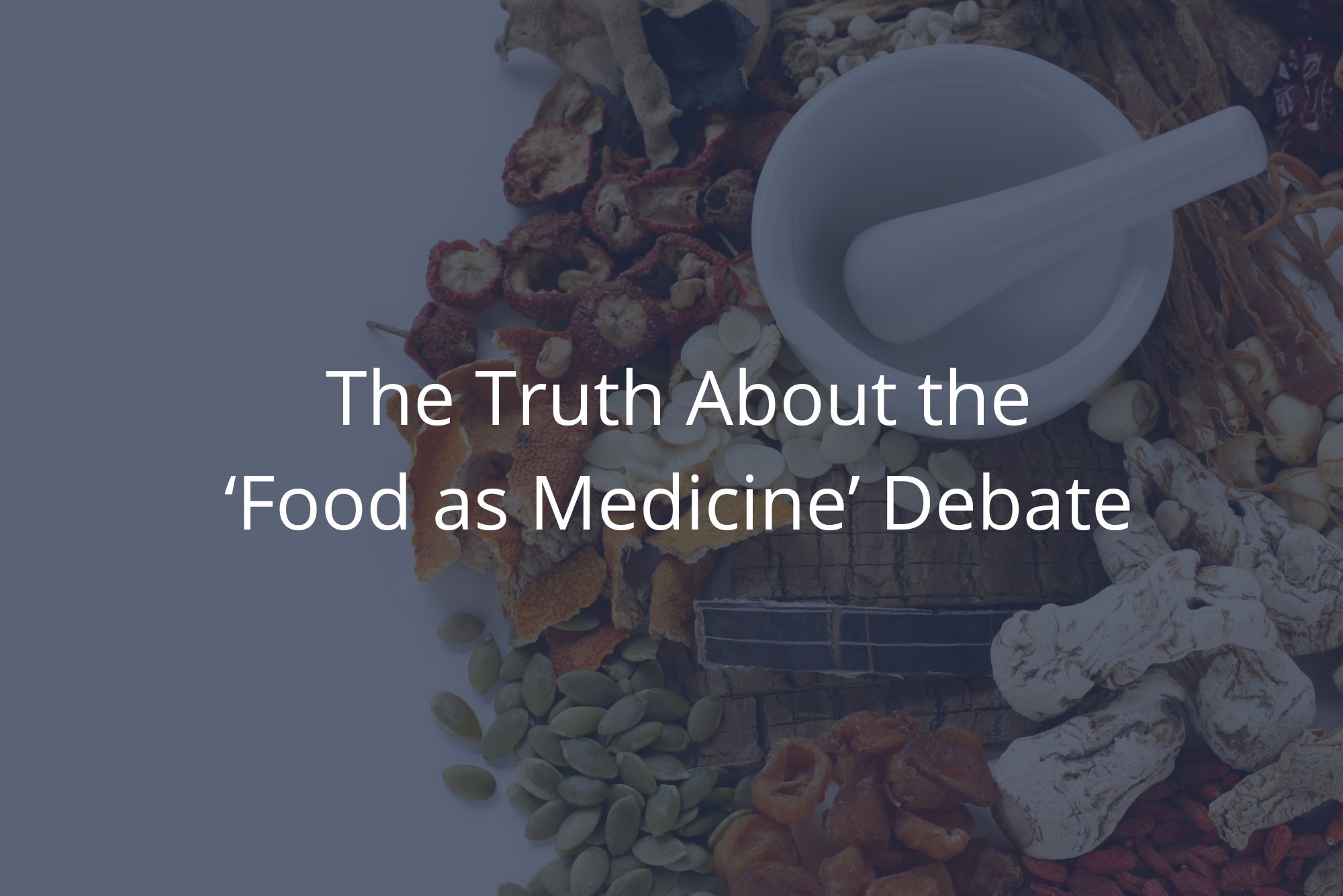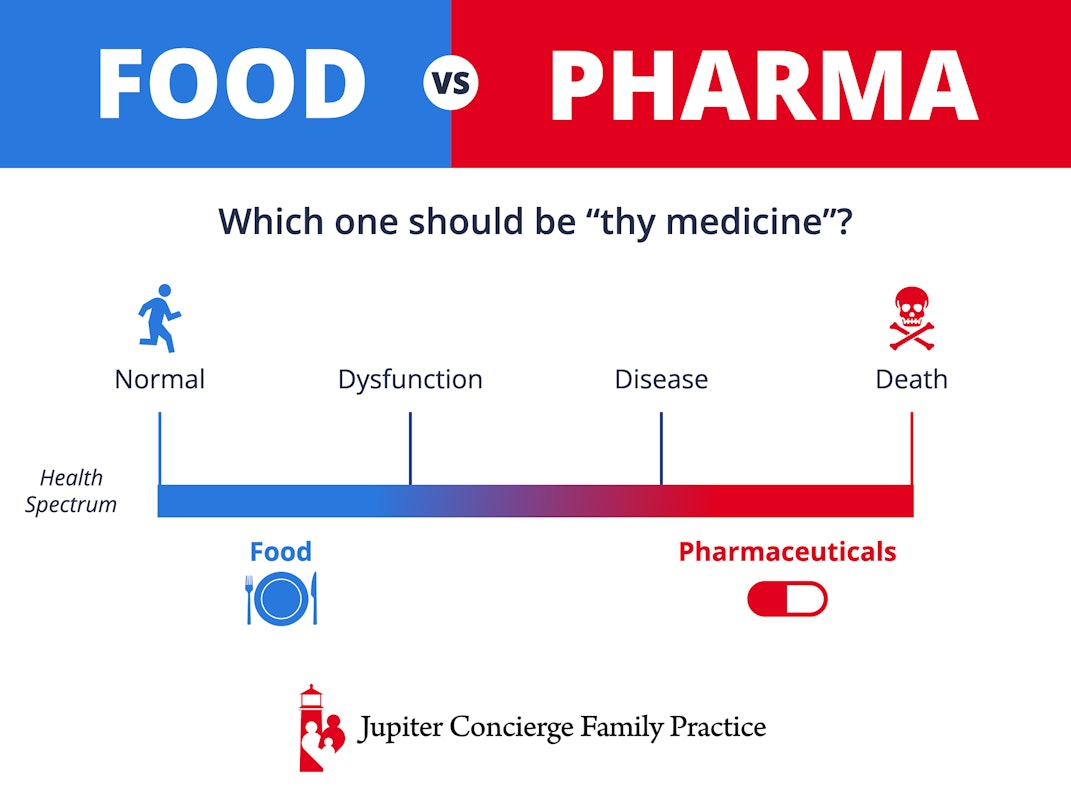
If I had to guess, I’d imagine you’ve heard the quote, “Let food be thy medicine,” sometimes followed up with, “and let medicine be thy food.”
The quote is scrawled across websites and t-shirts, and tossed around in various health food stores and groups. While it’s typically attributed to Hippocrates, the Classical Greek physician born in (or around) 460 BCE, there’s no evidence the quote came from him. In fact, a 2013 study revealed that the saying first emerged in the U.S. in the 1920s, gaining popularity in the ’70s.
Whether or not Hippocrates originated it, this pithy bit of sound advice has endured. We stand to gain — and lose — a great deal depending on what we eat.
Defining Food
Everything we consume can be either nourishing, or toxic. This includes what we take into our mouths (food and drink), what we breathe (air), and what we receive through our other senses (sights, sounds, etc.).
Each category is important. When we take care to consume only what is healthful, we’re nourished. But there’s another side, best captured in the old saying: garbage in, garbage out.
Polluted water makes us ill. Poor air quality delivers toxins to our systems. And inappropriate sensory content also produces negative consequences. (Both willingly and by default, the average American consumes almost eight hours of media every single day. That’s a lot to mentally chew on and digest!)
And this leads us to food.
Here, the same principle applies. Our bodies are fantastic at getting the best available benefits from the food we give them. But they aren’t magic wands. They can’t create benefits out of garbage.
Consuming garbage creates toxicity — most humans know and accept this.
We eschew moldy fruits and spoiled meats. We’re repelled by trash because we know it’s not good for us. Our instincts scream, “Not fit for consumption!”
And while we might not like that processed convenience and junk foods contribute to obesity, heart attacks, and digestive problems, we more or less accept it as truth… with a few spots of episodic denial when it comes to our own personal favorites.
Healthful food, on the other hand, gives us everything we need to build our bodies, and to keep them growing and healing.
Food offers us three vital components: proteins, carbohydrates, and fats, which our bodies break down into their smaller component parts. Once we have everything we need, our bodies’ blueprints — our DNA — then use those parts to build back up everything we need in good working order. (Learn more about the importance of digestion, rest, and immunity here.)
Pharma and Food Face Off
Pharmaceuticals are chemicals that drive certain processes in our bodies to a more helpful state. The precursor is disease, and pharmaceuticals are one way we shift operations in our bodies to deal with that disease more efficiently.
When an illness is severe or life-threatening, or when it can cause immediate damage to a person, pharmaceuticals are usually necessary interventions. It’s critical in choosing a pharmaceutical because the benefits should be balanced with the risks.
When To Use Pharmaceuticals
Infections — especially serious infections — are a good example of when pharmaceuticals excel at helping. A serious infection is a buildup of bacteria that overwhelms the immune system. When we take an antibiotic, the drug kills much of the bacteria, allowing our immune system to then take over and fight off the rest.
In the case of bacterial meningitis, for example, only intravenous antibiotics can kill the bacteria before the bacteria kills the patient; it’s that dangerous of a disease.
Pharmaceuticals can also help mitigate other disease processes. In cases of high blood pressure, for example, specific drugs bind to certain receptors in the body and lower blood pressure to prevent a stroke or heart attack. In cases of diabetes, medications help to keep blood sugar in check.
Prescription drugs are fast-acting and far-reaching. They sweep in, intervene, and change what’s happening in the body much faster than healthful eating can. However, they’re not without side effects, and while they help protect us from the devastating effects of many diseases, the underlying causes of those diseases remain unchanged.
When To Use Food as Medicine
While food is not a replacement for pharmaceuticals in acute, life-threatening situations, food can have an incredibly beneficial effect on the body’s health over time. In fact, eating for health can often prevent severe disease — and thus the need for pharmaceuticals — from developing in the first place.

Food can help keep dysfunction and disease at bay. As we move along the continuum toward disease, however, pharmaceuticals become more necessary.
Eating with a medicinal bent is a lifestyle. It’s a long-term, therapeutic approach to health that pays off. It’s also a way to support your body if you’ve already developed a long-term disease, and to prevent dysfunction from progressing. Here’s how to do it.
Food as Medicine
If pharmaceutical interventions are heroic lifeguards hauling us from death with life preservers, food is the patient swim instructor who teaches us how to stay afloat in the first place. Like learning swim strokes, these simple, repeated practices can help you navigate the waters of health and avoid the treacherous riptides of disease processes.
- Do your research. Depending on your health challenges and goals, you may have specific foods at your disposal that can augment your health. If you have high blood pressure, for example, a diet higher in potassium and lower in sodium will likely be very beneficial to you. If you have diabetes, foods high in chromium or with cinnamon in them may help lower your sugar. Talk to your physician to determine which food types best benefit you.
- Be particular. Time to rethink what being a “picky eater” means — and embrace it! Pick the foods that suit you and your body, and ignore convenience and processed foods. If it’s packaged, it’s likely not healthy. If you have to buy foods in a box, make sure the ingredients list is short and understandable without an advanced degree in biochemistry. Pro-tip: Shop around the perimeter of the grocery store to keep your foods as basic and healthful as possible. The aisles contain the shiny packages of preservatives.
- Think holistically. Remember — eating for health is a lifestyle, not a fad diet. It’s a strategy for the long term. Everything you put into your mouth has short-term and long-term consequences. The short-term consequences of ice cream may be pleasure, but the long-term results can be inflammation, weight gain, and eventual uncontrolled blood sugar. Remember to think long term.
- Consult a professional. After you talk to your physician about what makes sense for your body, consider seeing a nutritionist. These professionals will have excellent advice and ideas about how you can implement long-term, nourishing changes to your diet that are not only healthy, but delicious as well.
Conclusion
We may not be able to avoid pharmaceuticals altogether; infections and illness are a reality, and the more severe the illness, the more likely that pharmaceuticals are a necessary intervention.
What we can do, however, is remember that most disease develops over time, giving us the opportunity to make interventions before we get to full-blown illness. One of the most powerful ways we can intervene and even reverse our progress along the spectrum toward disease is to think long-term, mind what we eat, and consider food as our medicine.
